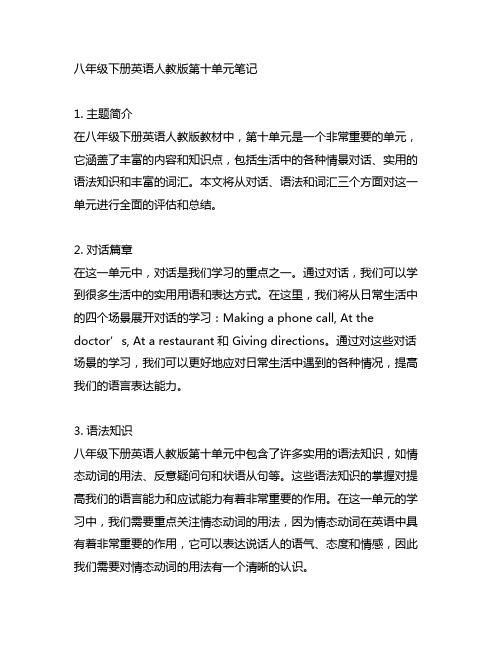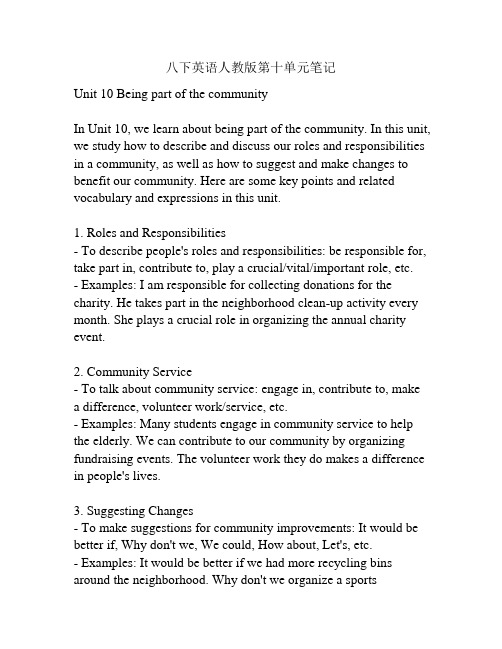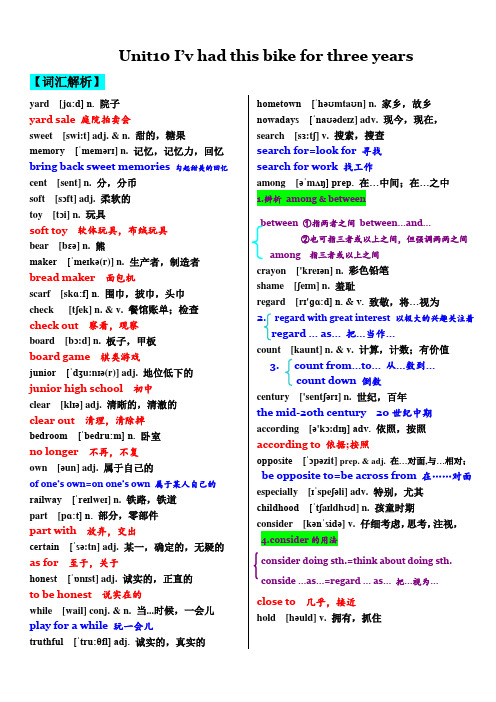人教版八下英语第十单元精学笔记
人教版八年级下册英语第十单元笔记。

人教版八年级下册英语第十单元笔记。
人教版八年级下册英语第十单元笔记第一部分:单词1. inspire [ɪnˈspaɪə] vt. 激励;鼓舞2. selection [sɪˈlekʃən] n. 选择;精选品3. challenge [ˈtʃæləndʒ] vt. 向……挑战;n. 挑战;难题4. showcase [ˈʃoʊkeɪs] n. 陈列柜;展示柜5. vision [ˈvɪʒən] n. 视力;视野;想象力6. passionate ['pæʃənət] adj. 充满激情的;热情的7. coverage [ˈkʌvərɪdʒ] n. 报道;新闻报道8. panel [ˈpænəl] n. 面板;专门小组9. emcee ['emˌsi:] n. 主持人;v. 主持第二部分:课文本单元中,我们学习了一篇名为《Everyday Heroes》的课文,这篇文章主要介绍了一些平凡而又伟大的英雄。
下面是几个重点内容:1. 每个人都可以成为英雄,只要用自己的方式去影响身边的人。
2. 这篇文章介绍了几个例子,如一位老师在教学上对学生的影响,一位志愿者对社区的贡献等。
3. 英雄不一定是那些能够打败坏人的超人,而是那些默默付出,用自己的方式去改变世界的人。
第三部分:重点短语1. make a difference:产生影响,有所作为2. be passionate about:对……充满热情3. take up the challenge:接受挑战4. in search of:寻找5. on the lookout for:寻找,留意第四部分:语法在本单元中,我们学习了本动词和被动语态的用法。
例如:1. Her speech inspired everyone in the room. (主动语态)2. Everyone in the room was inspired by her speech. (被动语态)在第二个例子中,每个单词的顺序都与主动语态不同,而且引导被动语态的单词“was”也需要根据主语的单、复数来变化。
最新八年级英语下人教版第十单元知识归纳

八年级英语下人教版第十单元知识归纳Unit 10 I’ve had this bike for three years.一、重点短语1.yard sale 庭院拍卖会2.board game 棋类游戏3.check out 察看;观察4.no longer 不再,不复5.to be honest 说实在的6.according to 依据,依照7.in one’s opinion 依......看8.a couple of 两个,几个9.as for 至于,关于10.once a year 一年一次二、语法难点现在完成时常与“for+时间段”或“since+时间点”连用。
1.for 作介词,后接时间段,表示“某个动作持续了多久。
Eg:I’ve been here for just over two years. 我来到这儿刚好两年多了。
2.since 可作介词,后接时间点,也可用作连词,后接从句,表示某个动作或情况从过去某一时间点一直持续到现在,从句用一般过去时。
Eg:He’s been here since two years ago. 他两年来一直住在这儿。
注意:for 和since引导的时间状语不能与终止性动词的肯定式连用,但可和其否定式连用。
Eg:Mr Smith hasn’t come to China for three years. 史密斯先生三年没来中国了。
I haven’t seen him since I came back. 自从我回来就没见过他。
针对性训练:用for 或since填空1.She has been ill ________ more than to two weeks.2.I haven’t met him __________ a long time.3.Mary has been here ___________ eight o’clock this morning.4.It hasn’t rained ____________ two months ago.5.They have been my friends _________I was a child.三、高频考点1.check out意为”价差;审查”,为动副结构,是及物动词短语。
八下英语人教版第十单元笔记(一)

八下英语人教版第十单元笔记(一)八年级英语人教版第十单元:Can you play the guitar?词汇积累•instrument 乐器•piano 钢琴•guitar 吉他•drums 鼓•violin 小提琴•flute 长笛•trumpet 小号•saxophone 萨克斯风•accordion 手风琴•play 弹奏•sing 唱歌•dance 跳舞•hobby 爱好句子练习•Can you play the guitar? 你会弹吉他吗?•Yes, I can. / No, I can’t. 是的,我会。
/ 不会。
•What musical instruments can you play? 你会弹奏哪些乐器?•I can play the piano, guitar and drums. 我会弹钢琴、吉他和鼓。
•What do you like doing in your free time? 你业余时间喜欢做什么?•I like playing guitar, singing and dancing. 我喜欢弹吉他、唱歌和跳舞。
•Playing musical instruments is my hobby. 弹奏乐器是我的爱好。
对话练习A: Can you play any musical instruments?B: Yes, I can play the guitar and piano. How about you?A: I can play the drums and violin.B: That’s really cool! Do you like playing music in your free time?A: Yes, I do. Playing musical instruments is one of my hobbies.B: Same here. I like playing the guitar, singing, and writing songs.A: That’s awesome! Maybe we could play music together sometime.B: That sounds like a great idea. Let’s do it!阅读理解Passage 1Tom is a music lover. He can play the guitar and the trumpet very well. Playing musical instruments is one of his hobbies. He often plays music with his friends in his free time. They sing and play musical instruments together. Tom thinks playing music can bring people happiness.Passage 2Linda is a talented musician. She can play the violin, the piano, and the saxophone very well. She started playing musical instruments when she was only five years old. Now she is a member of the school orchestra and has won many awardsin musical competitions. She wants to become a professional musician and play music for people all over the world.Passage 3David is a music teacher. He can play many musical instruments, such as the guitar, the drums, and the accordion. He loves teaching his students how to play music and watching them improve. He thinks playing music can not only bring joyto people but also help them develop their creativity and concentration. He encourages his students to practice every day and never give up.任务1.组织同学们进行一次音乐比赛,可以自己表演或合作演出。
人教版八年级下册英语第十单元笔记

人教版八年级下册英语第十单元笔记第十单元的内容主要围绕"安排假期"展开,主要学习了有关计划假期的表达和交流方式,以及描述假期活动和旅行经历的语言表达。
Unit 10 Topic 1 My Summer Vacation本课主要学习了描述暑假活动的语言表达。
学习了一些常用的动词短语,如have a picnic, go hiking, visit relatives, play sports 等,并针对这些动词短语进行了句型的练习。
通过学习文章的阅读,学会了如何用英语描述自己的暑假活动。
Topic 2 Where Did You Go on Vacation?本课主要学习了用于描述旅行经历的语言表达。
通过学习对话和阅读文章,了解了一些动词短语和副词短语,如take a trip, visit a museum, fly to, go sightseeing等,并结合这些短语进行了对话和文章的练习。
Topic 3 What Are You Going to Do?本课主要学习了用于计划假期活动的语言表达。
学习了一些常用的短语和句型,如make plans, go to the beach, have a barbecue, watch movies等,并进行了短语和句型的练习。
通过阅读文章,学会了如何用英语描述自己的假期计划。
Topic 4 What Will You Do Next Year?本课主要学习了用于描述将来假期计划的语言表达。
学习了一些常用的词汇和短语,如next year, maybe, hope to, have a great time 等,并进行了句型的练习。
通过听写练习和阅读文章,训练了听力和阅读理解的能力。
总结:通过学习这一单元的内容,可以更好地表达自己的假期活动和计划,并能够理解他人对假期活动和计划的描述。
同时,也通过阅读文章和听力练习,提高了听力和阅读理解的能力。
人教版八下英语书第10单元笔记

人教版八下英语书第10单元笔记人教版八下英语书第10单元笔记1. 主题:What do you want to be?2. 生词:(1) astronaut (n.) 宇航员(2) engineer (n.) 工程师(3) lawyer (n.) 律师(4) fashion designer (n.) 时装设计师(5) accountant (n.) 会计师(6) athlete (n.) 运动员3. 句型:(1) What do you want to be when you grow up? 你长大后想当什么?(2) I want to be an astronaut. 我想当宇航员。
(3) Why do you want to be an engineer? 你为什么想当工程师?(4) What do engineers do? 工程师做什么?(5) How do you become a lawyer? 怎样成为一名律师?(6) Would you like to be a fashion designer like your mother? 你想成为像你妈妈一样的时装设计师吗?(7) What are the requirements to become an accountant? 成为一名会计师需要什么条件?(8) Do you think you have what it takes to be an athlete? 你认为自己有成为一名运动员的素质吗?4. 文章结构:(1) 开头介绍主题:What do you want to be?(2) 介绍生词并注明词性和汉语意思(3) 分段介绍各个职业,并列举问答句型以及突出特点和要求(4) 总结句:No matter what you want to be, it takes hard work and dedication to achieve success. 无论你想成为什么,都需要通过努力工作和专注去实现成功。
最全面人教版八年级下册英语第十单元知识点归纳总结

Unit 10 I've had this bike for three years.一、词汇与短语◆重点单词A部分1.yard 院子n.2.junior 地位(或职位、级别)低下的adj. 3.sweet 甜蜜的;甜的;含糖的adj.4.clear 清理;清除v.5.memory 记忆;回忆n.6.bedroom 卧室n.7.cent 分;分币n.8.own 拥有;有v.9.toy 玩具n.10.railway 铁路;铁道n.11.bear 熊n.12.part 离开;分开v.13.maker 生产者;制订者n.14.certain 某种;某事;某人adj. 15.scarf 围巾;披巾;头巾n.16.honest 诚实的;老实的adj. 17.soft 软的;柔软的adj.18.while 一段时间;一会儿n. 19.check 检查;审査v. & n.20.truthful 诚实的;真实的adj. 21.board 板;木板n.22.hometown 家乡;故乡n.B部分1.nowadays 现今;现在;目前adv.2.century 百年;世纪n.3.search 搜索;搜査v. & n.4.especially 尤其;特别;格外adv. 5.among 在(其)中;……之一prep.6.childhood 童年;幼年n. 7.crayon 彩色铅笔(或粉笔、蜡笔) n.8.consider 注视;仔细考虑v. 9.shame 羞耻;羞愧;惭愧n.10.hold 拥有;抓住v.11.regard 将…认为;把…视为;看待v.12.count 数数v.13.opposite 与…相对;在…对面prep. 对面的;另一边的adj.◆重点短语A部分1.yard sales 庭院拍卖会2.to be honest 说实在的3.give sth. away to……把某物捐赠给……4.in need 需要5.soft toys 软体玩具;布绒玩具6.bread makers 面包机7.check out 察看;观察8.not……anymore 不再……9.junior high school 初级中学10.a couple of months 几个月11.board games棋类游戏12.for a long time 好长时间13.clear out清理;丢掉14.grow up fast 长得快15.no longer 不再;不复16.decide to do sth. 决定做某事17.part with 放弃,交出(尤指不舍得的东西)18.for a while 一会儿19.as for 至于;关于B部分1.according to 依据;按照2.search for work 找工作3.close to 几乎;接近4.with great interest 带着极大的兴趣5.hometown feelings 家乡情6.be true of…对…适用,符合于…7.some…others…一些…另一些…8.be interested in…对…感兴趣9.millions of 数百万的10.in order to…为了…◆重点句子A部分1.—How long have you had that bike over there?那边的那辆自行车你买了多长时间了?—I've had it for three years! 我买了三年了!2.We have decided to each sell five things that we no longer use.我们决定每人卖掉5件不再用的东西。
八年级下册英语人教版第十单元笔记

八年级下册英语人教版第十单元笔记1. 主题简介在八年级下册英语人教版教材中,第十单元是一个非常重要的单元,它涵盖了丰富的内容和知识点,包括生活中的各种情景对话、实用的语法知识和丰富的词汇。
本文将从对话、语法和词汇三个方面对这一单元进行全面的评估和总结。
2. 对话篇章在这一单元中,对话是我们学习的重点之一。
通过对话,我们可以学到很多生活中的实用用语和表达方式。
在这里,我们将从日常生活中的四个场景展开对话的学习:Making a phone call, At the doctor’s, At a restaurant和 Giving directions。
通过对这些对话场景的学习,我们可以更好地应对日常生活中遇到的各种情况,提高我们的语言表达能力。
3. 语法知识八年级下册英语人教版第十单元中包含了许多实用的语法知识,如情态动词的用法、反意疑问句和状语从句等。
这些语法知识的掌握对提高我们的语言能力和应试能力有着非常重要的作用。
在这一单元的学习中,我们需要重点关注情态动词的用法,因为情态动词在英语中具有着非常重要的作用,它可以表达说话人的语气、态度和情感,因此我们需要对情态动词的用法有一个清晰的认识。
4. 词汇积累在这一单元中,我们还要学习大量的生活常用词汇和短语,这些词汇和短语是我们在日常生活中经常使用的,因此对它们的掌握对我们的语言能力提高有着非常大的帮助。
在这里,我们需要对这些词汇进行分类和整理,以便更好地掌握和记忆这些词汇。
总结与回顾通过对八年级下册英语人教版第十单元的全面评估,我们对对话、语法和词汇有了更深入的理解。
在对话方面,我们学会了更多生活中的实用用语和表达方式;在语法方面,我们掌握了更多实用的语法知识;在词汇方面,我们积累了更多的生活常用词汇和短语。
这些都为我们的语言能力提高和应试能力提升奠定了坚实的基础。
个人观点我认为,八年级下册英语人教版第十单元是一个非常重要的单元,它为我们的语言学习和应试能力提升提供了丰富的内容。
人教英语八年级下册10单元知识点笔记

人教英语八年级下册10单元知识点笔记Unit 10 I’ve had this bike for three years.1.现在完成时态:(8单元现在完成时态(一))1.含义:表示过去发生或已经完成的某一动作对现在造成的影响或结果;或是表示过去的动作或状态从过去一直持续到现在一段时间。
2.结构:have/has+V过去分词3.肯定句:主语+have/has+V过去分词+…….否定句:主语+haven’t/ hasn’t+V过去分词……一般疑问句:Have/Has+主语+V过去分词+…….?肯定回答:Yes,主语对应的人称代词+have/has.否定回答:No,主语对应的人称代词+haven’t/ hasn’t.注意:变一般疑问句或否定句时,already要改为yet.4.常用时间标志词:already, yet, ever, never, since, for+段时间,sofar, up to now, 次数,recently, 等。
5.(9单元现在完成时态(二)):have been to….去过某地(已回,多与次数,ever, never连用)have gone to…..去了某地(未回)have been in….在某地(待了多久,多与延续时间状语连用)注意:当介词后面的地点为副词性地点时,介词要省略。
如:I have been there for a year.(省略的in) 我在那儿已经待了一年了。
I have been home. (省略的to) 我已经回家了。
6.(10单元:现在完成时态(三))现在完成时后有延续性时间状语,则非延续性动词要改为延续性动词。
如:marry-----be marriedBegin---be on end/ finish------be overDie----be deadLeave sp.----be away from sp.Get up----be upReach/come/go/move to/get to sp------be in/ at sp.Return to-----be back to go out-----be outBorrow------keepBuy-----havePut on---wear.Join-----be inBecome---beFall asleep-----be asleep7.现在完成时态,for+段时间= since+段时间+ago.=since+时间点2.Among.在...其中,。
人教版八年级下册英语第十单元笔记

人教版八年级下册英语第十单元笔记Unit 10 Saving the Earth本单元是关于保护地球环境的话题。
通过本单元的学习,我们将了解到环境问题的严重性,以及我们个人应该采取的行动来保护地球。
下面是本单元的相关参考内容:一、重点短语和句型1. protect the earth 保护地球2. take care of 照顾,照料3. throw away 扔掉4. turn off 关闭5. pick up 捡起6. save water 节约用水7. save electricity 节约用电8. cut down 砍伐9. plant trees 种树10. recycle paper 回收纸张11. reuse bottles 重复使用瓶子12. Don't throw away the plastic bottles. 不要扔掉塑料瓶。
13. We should turn off the lights when we leave the room. 当我们离开房间时应该关掉灯。
14. Remember to recycle the paper to save trees. 记得回收纸张以保护树木。
二、重点词汇1. environment (n.) 环境2. pollution (n.) 污染3. garbage (n.) 垃圾4. waste (n.) 废物5. plastic (n.) 塑料6. bottle (n.) 瓶子7. energy (n.) 能源8. resource (n.) 资源9. global warming (n.) 全球变暖10. climate change (n.) 气候变化11. deforestation (n.) 河狭缩12. extinction (n.) 灭绝13. sustainable (adj.) 可持续的14. renewable (adj.) 可再生的15. endangered (adj.) 濒危的16. disposable (adj.) 一次性的三、篇章和练习1. 话题写作:保护环境Prompt: Write an essay about how to protect the environment. Your essay should include the following points:- Why is it important to protect the environment?- What are some ways to protect the environment?- What can we do as individuals to protect the environment?(词数:100-120)In today's world, environmental protection has become increasingly important. There are several reasons why we should protect the environment. Firstly, pollution and waste are causing serious damage to our natural resources and ecosystems. Secondly, global warming and climate change have a negative impact on our planet and can lead to extreme weather events. Finally, deforestation and the extinction of species are destroying our biodiversity.There are many ways we can protect the environment. Firstly, we should reduce, reuse, and recycle. This means using fewer resources, reusing products instead of throwing them away, and recycling materials such as paper, plastic, and glass. Secondly, we should save energy by turning off lights and appliances when not in use and using energy-efficient products. Thirdly, we should conserve water by taking shorter showers, fixing leaky faucets, and watering plants at appropriate times.As individuals, there are many things we can do to protect the environment. We can pick up litter and dispose of it properly, plant trees to combat deforestation, and support organizations that work towards environmental conservation. We can also educate others about the importance of environmental protection and influence them to take action.In conclusion, protecting the environment is vital for the future of our planet. By reducing pollution, conserving resources, and takingindividual actions, we can make a difference and ensure a sustainable future for generations to come.2. 语法练习:情态动词Choose the correct option to complete each sentence.1. We _______ turn off the lights when we leave the room.A. mustB. canC. shouldD. might2. You _______ throw away plastic bottles. You can recycle them.A. don't needB. have toC. mustn'tD. can't3. _______ you pick up litter in the park, please?A. MustB. ShouldC. CanD. May4. I think we _______ recycle paper to save trees.A. mustB. needC. couldD. should5. They _______ reduce, reuse, and recycle to protect the environment.A. couldB. mightC. canD. must答案:1C 2B 3B 4D 5D四、常见易混词辨析1. garbage vs. wastegarbage指的是垃圾中的可湿垃圾,如剩饭剩菜等;而waste 则是总称,包括如纸张、塑料、金属等各种垃圾。
人教版八下英语 Unit 10知识点归纳

Unit 10 I’ve had this bike for three years.一.短语归纳1. how long 多久,多长时间2. have a yard sale 举行庭院拍卖会3. give away 捐赠;赠送4. not…anymore 不再……5. welcome to ...欢迎到……6. a bit 一点儿,稍微7. board games 棋类游戏8. check out 察看;观察9. a bread maker 面包机10. grow up 长大11.clear out 收拾,整理12. a lot of 许多13.no longer 不再;不复14. at first 起初15.for example 例如16. as for ...至于……,关于……17.a train and railway set 一套火车和铁路轨道的玩具18.to be honest 说实在的19. junior high school 初级中学20.search for 寻找21. across from 在……对面22.according to依据;按照23. i n one’s opinion 依……看24.in order to 为了25. at least 至少26. once or twice a year=one or two times 一年一两次27. millions of 数以百万计的(hundred, thousand用法相同)二、用法归纳1.It’s + adj.(+for sb.)+to do sth. (对某人来说)做某事是……的。
2.decide to do sth. 决定做某事3.love doing sth. 喜欢做某事4.have been in+地点在某处待了多久5.hope to do sth 希望做某事7.one of +the +形容词最高级+可数名词复数+单数谓动:最……的……之一是……ed to do sth. 过去常常做某事9.need to do sth. 需要做某事三、重要句型:1. -How long have you had that bike over there?那边的那辆自行车你买了多长时间了?-I’ve had it for three years. 我买了三年了。
八年级下册第十单元笔记

八年级下册第十单元笔记一、重点单词。
1. yard.- n. 院子。
例如:There are some flowers in the yard.(院子里有一些花。
)2. sweet.- adj. 甜的;含糖的;可爱的。
- 作“甜的”解时,例如:This apple is very sweet.(这个苹果很甜。
)- 作“可爱的”解时,例如:She has a sweet smile.(她有一个可爱的笑容。
)3. memory.- n. 记忆;回忆。
复数形式是memories。
例如:This photo brings back many memories.(这张照片唤起了许多回忆。
)4. scarf.- n. 围巾;披巾;头巾。
复数形式是scarfs或scarves。
例如:She is wearing a beautiful scarf.(她戴着一条漂亮的围巾。
)5. soft.- adj. 软的;柔软的。
例如:The pillow is very soft.(这个枕头很柔软。
)6. board.- n. 板;木板。
例如:There is a blackboard on the wall.(墙上有一块黑板。
)- v. 上(船、飞机等)。
例如:Passengers are boarding the plane.(乘客们正在登机。
)7. check.- v. 检查;审查。
例如:The doctor will check your body.(医生将检查你的身体。
)- n. 支票。
例如:He wrote a check for 100 dollars.(他开了一张100美元的支票。
)8. junior.- adj. 地位(或职位、级别)低下的。
例如:He is a junior officer.(他是一名下级军官。
)- n. 年少者;晚辈;等级较低者。
例如:He is my junior.(他是我的晚辈。
人教版八下英语书第10单元笔记

人教版八下英语书第10单元笔记Unit 10 Making a DifferenceIn this unit, we will learn about making a difference in society and the importance of volunteering. We will explore different ways that people can contribute to their communities and the world. Part 1: Social issues and solutions1. Social issues- Poverty: millions of people around the world are living in poverty and lack basic necessities such as food, shelter, and healthcare.- Education: many children, especially in developing countries, lack access to education due to various reasons such as lack of resources, poverty, and cultural norms.- Environmental pollution: the increase in industrial activities and human consumption has resulted in severe pollution of air, water, and soil, which is harmful to both humans and the environment. 2. Solutions- Volunteer work: individuals can join organizations that aim to alleviate social issues and contribute their time and skills to make a difference.- Fundraising: organizing events and campaigns to raise funds for charities and nonprofit organizations that work towards solving social issues.- Advocacy: raising awareness and advocating for social change through social media, community events, and public speeches. Part 2: Famous social activists1. Mahatma Gandhi: a key figure in India's independencemovement, he advocated for nonviolent civil disobedience and peaceful protest against British rule.2. Mother Teresa: a Catholic nun who dedicated her life to serving the poor and the sick in India.3. Malala Yousafzai: a young Pakistani activist who fought for girls' education and became the youngest-ever Nobel Prize laureate. Part 3: Role models and inspiring stories1. Wangari Maathai: a Kenyan environmental activist who founded the Green Belt Movement, which focused on tree planting and environmental conservation.2. Craig Kielburger: a Canadian activist who founded Free the Children, a charity that empowers young people to take action against poverty and exploitation.Part 4: Volunteering and making a difference1. Benefits of volunteering- Personal growth and development: volunteering helps individuals develop new skills, gain confidence, and expand their knowledge. - Social connection: volunteering provides an opportunity to meet new people and build meaningful relationships.- Making a difference: by volunteering, individuals can directly contribute to solving social issues and improving the lives of others.2. Ways to get involved- Local community service: individuals can volunteer at local shelters, food banks, or community centers to support those in need. - International volunteering: individuals can join volunteer programs abroad to support communities in developing countries. - Virtual volunteering: individuals can contribute their time andskills remotely through online platforms, assisting with tasks such as translation, tutoring, or content creation.Overall, this unit highlights the importance of making a difference and the various ways individuals can contribute to society. It encourages students to develop empathy and take action to create positive change in their communities and the world.。
人教版八年级下册英语第十单元笔记。

人教版八年级下册英语第十单元笔记。
《人教版八年级下册英语第十单元笔记》Unit 10 A mystery in the computer game【词汇】1. mysterious adj. 神秘的;不可思议的2. doorbell n. 门铃3. replied v. 回答;答复4. radar n. 雷达5. solve v. 解决;解答6. message n. 消息;信息7. pass n. 路过;通过8. code n. 密码;代码9. teenager n. 青少年;十几岁的人10. wonder v. 想知道;想弄明白11. scanner n. 扫描仪;扫描设备12. disappear v. 消失;不见13. suspect v. 怀疑;猜想14. kidnapper n. 绑架者;拐子15. rescue v. 营救;解救【重点短语】1. open the door 打开门2. ring the doorbell 按门铃3. solve the mystery 解开谜团4. check the radar 检查雷达5. receive a message 收到一条消息6. walk past 路过7. scan the code 扫描代码8. disappear from 从...消失9. suspect of 怀疑...犯罪10. carry out 执行;实施【重点句型】1. What a mysterious computer game! 多么神秘的电脑游戏啊!2. He replied to my message.他回复了我的消息。
3. I wonder how he solved the mystery. 我想知道他是如何解开谜团的。
4. The car disappeared from the road.那辆车从路上消失了。
5. The police suspect him of kidnapping. 警察怀疑他绑架了人。
Unit10笔记22-23人教版英语八年级下册

Grammar Foucus
Language points 1.a couple of两个;少数几个
Point
a couple of为固定词组,意为“少数几个”,相当于several。如:
①He bought a couple of books for his daughter. 他为他女儿买了几本书。
我十岁的时候就学习英语了。
Language points 现在完成时以及for, since的用法
Point
(2)现在完成时态中延续性动词与非延续性动词的转换: 1)非延续性动词也被称为终止性动词、瞬间性动词,表示不能延续的动作, 这种动作发生后立即结束。如:open, close, leave, die, become, begin, finish, come, go, move, borrow, lend, buy等。非延续性动词在肯定句中 与表示时间点的状语连用,如:two years ago, at 5 o'clock。如: He died 5 years ago.他5年前去世了。
smaller.
Point
随着他们的长大,我们的房子似乎变得更小了
as表示两个同步发生的动作或行为,意为“随着……”。如:
①As time went by, she became more and more beautiful.
随着时间的流逝,她变得越来越美了。
Language points 2.As they get bigger, our house seems to get
②You can search me if you think you're man enough. 有胆的话,你可以搜我的身。
八下英语人教版第十单元笔记

八下英语人教版第十单元笔记Unit 10 Being part of the communityIn Unit 10, we learn about being part of the community. In this unit, we study how to describe and discuss our roles and responsibilities in a community, as well as how to suggest and make changes to benefit our community. Here are some key points and related vocabulary and expressions in this unit.1. Roles and Responsibilities- To describe people's roles and responsibilities: be responsible for, take part in, contribute to, play a crucial/vital/important role, etc.- Examples: I am responsible for collecting donations for the charity. He takes part in the neighborhood clean-up activity every month. She plays a crucial role in organizing the annual charity event.2. Community Service- To talk about community service: engage in, contribute to, make a difference, volunteer work/service, etc.- Examples: Many students engage in community service to help the elderly. We can contribute to our community by organizing fundraising events. The volunteer work they do makes a difference in people's lives.3. Suggesting Changes- To make suggestions for community improvements: It would be better if, Why don't we, We could, How about, Let's, etc.- Examples: It would be better if we had more recycling bins around the neighborhood. Why don't we organize a sportstournament to raise funds for the local school? We could plant more trees to improve the environment in our community.4. Active Citizenship- To discuss active citizenship: participate in, actively contribute to, make a positive impact, take part in decisions, etc.- Examples: Active citizens participate in community activities and events. We can actively contribute to our community by volunteering our time and skills. Taking part in decisions related to our community can help make a positive impact.5. Giving Opinions- To give opinions and reasons: in my opinion, I think/feel that, because, for example, etc.- Examples: In my opinion, everyone should participate in community service. I think that cleaning up the neighborhood is important because it creates a cleaner environment for everyone. For example, if we all plant more trees, we can improve the air quality.Overall, Unit 10 focuses on the importance of being part of a community and making positive contributions. By understanding our roles and responsibilities, engaging in community service, suggesting changes, and being active citizens, we can create a better and more harmonious community.。
人教版新目标初中英语八年级下册Unit10学霸笔记

Unit10 I’v had this bike for three years 【词汇解析】yard [jɑ:d] n. 院子yard sale 庭院拍卖会sweet [swi:t] adj. & n. 甜的,糖果memory [ˈmemərɪ] n. 记忆,记忆力,回忆bring back sweet memories 勾起甜美的回忆cent [sent] n. 分,分币soft [sɔft] adj. 柔软的toy [tɔi] n. 玩具soft toy 软体玩具,布绒玩具bear [bɛə] n. 熊maker [ˈmeɪkə(r)] n. 生产者,制造者bread maker 面包机scarf [skɑ:f] n. 围巾,披巾,头巾check [tʃek] n. & v. 餐馆账单;检查check out 察看,观察board [bɔ:d] n. 板子,甲板board game 棋类游戏junior [ˈdʒu:nɪə(r)] adj. 地位低下的junior high school 初中clear [klɪə] adj. 清晰的,清澈的clear out 清理,清除掉bedroom [ˈbedru:m] n. 卧室no longer 不再,不复own [əun] adj. 属于自己的of one’s own=on one’s own 属于某人自己的railway [ˈreɪlweɪ] n. 铁路,铁道part [pɑ:t] n. 部分,零部件part with 放弃,交出certain [ˈsə:tn] adj. 某一,确定的,无疑的as for 至于,关于honest [ˈɒnɪst] adj. 诚实的,正直的to be honest 说实在的while [wail] conj. & n. 当...时候,一会儿play for a while 玩一会儿truthful [ˈtru:θfl] adj. 诚实的,真实的hometown [ˈhəʊmtaʊn] n. 家乡,故乡nowadays [ˈnaʊədeɪz] adv. 现今,现在,search [sɜ:tʃ] v. 搜索,搜查search for=look for 寻找search for work 找工作among [əˈmʌŋ] prep. 在…中间;在…之中1.辨析among & betweenbetween ①指两者之间between…and…②也可指三者或以上之间,但强调两两之间among 指三者或以上之间crayon ['kreɪən] n. 彩色铅笔shame [ʃeɪm] n. 羞耻regard [rɪ'ɡɑ:d] n. & v. 致敬,将…视为2. regard with great interest以极大的兴趣关注着regard … as…把…当作…count [kaunt] n. & v. 计算,计数;有价值3. count from…to…从…数到…count down 倒数century ['sentʃərɪ] n. 世纪,百年the mid-20th century 20世纪中期according [ə'kɔ:dɪŋ] adv. 依照,按照according to 依据;按照opposite [ˈɔpəzit] prep. & adj. 在…对面,与…相对;be opposite to=be across from 在……对面especially [ɪˈspeʃəli] adv. 特别,尤其childhood [ˈtʃaɪldhʊd] n. 孩童时期consider [kənˈsidə] v. 仔细考虑,思考,注视,4.consider的用法consider doing sth.=think about doing sth. conside …as…=regard … as…把…视为…close to 几乎,接近hold [həuld] v. 拥有,抓住重点句型1.It ’s+adj (+for sb)+to do sth (对某人来说)做某事是......2.decide to do sth 决定做某事3.have been in+地点 在某处待了多久 5.hope to do sth 希望做某事 6. consider doing sth 考虑做某事 7.be special to sb. 对某人来说是特殊 8.give sth away to sb. 把某物捐给某人 9.be busy with sth. 忙于某事 10.be busy doing sth.忙于干某事【衔接中考】1.辨析四个“家”home 侧重地址 是地点副词house 侧重建筑物 family 侧重家人/家庭room ①指房间(可名) ② 指空间(不可名)2.辨析 one ,that & itone 泛指 ①代替前边提到的同类不同物 ②代替可名单,复数ones that 特指 ①可指同类物相异②代替上文提到的事物(比较级) ③代替不可名it 特指 ①前文提到的同类同物单数/不可名 (复数用them )②不明身份的人/物③可作虚主语④可作虚宾语3.end 的用法in the end =finally “最后” 单独使用 at the end of+名词 “在……的末端”;“在……的尽头”by the end of +时间 “截止到……时候”(常用于过去完成时中)4.辨析 else & otherelse adv. 疑问词+else 不定代词+else other adj. other+名词【✿拓展✿】One …the other …一个….另一个…. (两者中) Some … the others ….一些…其余的…(三者或以上)On one hand …….,on the other hand …. 一方面……,另一方面……5.fall over ,fall down & fall offfall over 强调向前摔倒,跌倒,绊倒fall down 强调滑到,倒下fall down from+宾语fall off 跌落,从……掉下来6. 辨析die from & die ofdie from 通常在外部原因(事故,缺乏食物等)造成的死亡die of 通常指人体自身原因(年老,忧伤等)造成的死亡7.hear 的用法hear v.听到;听说(hear-heard-heard)hear from sb.收到某人的来信hear of/about sth./sb. 听说某事/某物hear sb. do sth. 听到某人做了某事hear sb. doing sth.听到某人正在干某事8.辨析leave & forgetleave “忘了带;丢下”leave sth.+地点forget “遗留;拉下”forget sth.9..invite的用法①invite sb.to do sth. 邀请某人干某事invite V. 邀请②invite sb. to sp. 邀请某人去某地③invite sb.for sth. 为某事邀请某人invitation n.邀请10.辨析:die ,death, dead & dyingdie V. 死短暂性动词death n. 死亡dead adj. 死的be dead 表示状态dying adj. 要死的;垂死的11.辨析三个“旅行”journey 指长途旅行trip 指短途旅行;郊游travel 指旅行;游历12.lie 的用法①lie(lie-lay-lain)V. “躺”lie on 躺在……上;lie down 躺下②lie(lie-lay-lain)V. “位于;处于”③lie (lie-lied-lied)V. 说谎lie to sb.对某人撒谎④lie (lie-laid-laid)V. “产卵;下蛋;安置;放置”⑤lie n. (可数名词)谎言;假话tell a lie =tell lies 说谎3。
八下英语第十单元笔记(一)

八下英语第十单元笔记(一)八年级英语第十单元笔记一、词汇1. 情感词汇•excited:激动的•nervous:紧张的•confident:自信的•embarrassed:尴尬的•disappointed:失望的•proud:骄傲的2. 日常用语•How are you?:你好吗?•What’s up?:有什么事吗?•See you later!:待会儿见!•Take care.:保重。
二、语法1. 祈使句祈使句是表达命令、请求、劝告、建议等语气的句子。
常用的祈使句开头有:•Listen!•Look!•Stop!•Come here!2. 一般现在时一般现在时表示现在的状态、习惯或经常性的动作。
一般现在时的肯定句结构为“主语+动词原形(+其他)”。
例如:•I play basketball every day.三、阅读理解1. 阅读技巧•看标题:了解文章大意•看开头和结尾:确定文章主题和结论•扫描:快速找到自己需要的答案•理解上下文:猜测生词的含义2. 阅读策略•预测:根据标题、插图、开头等预测文章内容•提问:在阅读过程中不断提问,帮助理解文章•加深理解:反复阅读,看出文章中的重点和细节四、口语表达1. 情景对话•A: What are you doing?•B: I’m listening to music.•A: What kind of music do you like?•B: I like pop music. How about you?•A: I like rock music.2. 描述事物•This is a laptop.•It has a 13-inch screen.•It runs on Windows operating system.•It is light and portable.五、写作练习1. 书信写作书信是一种常用的交流方式,可以用于向朋友、家人、老师、领导等人写信。
- 1、下载文档前请自行甄别文档内容的完整性,平台不提供额外的编辑、内容补充、找答案等附加服务。
- 2、"仅部分预览"的文档,不可在线预览部分如存在完整性等问题,可反馈申请退款(可完整预览的文档不适用该条件!)。
- 3、如文档侵犯您的权益,请联系客服反馈,我们会尽快为您处理(人工客服工作时间:9:00-18:30)。
八年级英语第十单元精学笔记学生姓名所在班级所在学队制作人单元课时计划精学要求1、仔细研读教材,根据教材,完成下列填空。
2、每一知识点,都要求互检互签,互检在知识点的右侧空白处签上检查人员的名字。
基础知识重点知识难点知识知识点一、单词闯关1.甜的含糖的________________2.诚实的老实的_______________3. 百年世纪_________________4. 记忆回忆________________5..软的柔软的________________6. 围巾___________ _____7.搜索搜查__________________ 8.将......认为;看待______________ 9.尤其特别__________________10.注视仔细考虑________________ 11.卧室____________________ 12. 家乡_____________ ____ 13.一段时间_________________ 14. 在……对面________________ 15.不在、不复______________16. 某些________________17. 依据按照________________ 18. 拥有抓住__________19.庭院____________________ 20. 羞耻羞愧惭愧______________ 21.童年___________________ 22. 彩色铅笔__________________ 23.数数__________________ 24.百年、世纪__________________ 25.诚实的、真实的_____________ 26. 老实的_________________27.铁路、铁轨________________ 28.放弃、交出__________________29. 板、木板________________30. 生产者、制定者_____________【检测】1.There is a _________ (铁路)between the two cities.2.This visit will always remain in my ____________ (家乡).3. He is an ________(诚实的)boy.4.One ___________(世纪)has one hundred years.5._____________(坚持)on, Jim is coming.知识点二、短语闯关1.放弃_______________________2.举行庭院拍卖____________________3.保留她的旧东西_______________4.在庭院拍卖中_______________5.决定要赠送的东西___________________6. 收集了如此多的东西________________________7. 这些年来_________________ 8. 不再… ___________________________ 9. 难以出售_________________ 10. 某些东西________________________11. 顺便说一下________________ 12. 那边__________________13. 带回(勾起)甜美的回忆________________________________14. 赠送给孩子们__________________15.需要的人_________________16.浏览,温习__________________ 19. 尽管_______________________20. 毛绒玩具_____________________21. 特殊的意义_________________ 22. 面包机____________23. 自制的面包_________________ 24. 适合我_____________________25. 欢迎到……_________________26. 儿童阳光之家_________________27. 几个月… _________________ 28.一点_________________________29.察看,观察_________________30. 棋类游戏______________31.因……感到羞愧______________32.无羞耻心__________________33.令某人感到羞耻的是_______________ 34.肯定要做某事_____________ 35.对某事确定,有把握___________________ 知识点三:现在完成时1. 标志词:已经(肯定句)_______,刚刚_______,已经(用于否定句)______,从不_______,迄今为止_______,直到现在______________,最近_______,在过去的三年里______________ ,以前since+________,for+_______2)现在完成时和一般过去时的异同点:共同点:动作都在过去。
不同点:和现在有无关系。
(与现在有关的过去动作用现在完成,与现在无关的过去动作用一般过去。
)3.一般过去时的标志词:昨天_________前天_________三天前_________昨天晚上_________上个月_________,过去_________刚才_________4.易错点:1)have gone to+地点,表示“__________________”(人已走,尚未回。
只用于第三人称。
)They ______ ________ ____ Europe.他们已经去了欧洲。
2)have been to+地点,表示“_________”(人已回)I have been to Europe.我曾经去过欧洲。
3) __________________+地点+时间段,表示“在/来某地多久”。
I ______ ______ ______ Europe for three weeks.我在欧洲三个星期了。
规律:__________________ +次数/地点__________________+地点+for/since人不在这,用_________________。
精练:1.--Where is Jim?--He _____ _____ _____ the library.2. I _____ ____ _____ New York twice.3. He ______ _____ there three times.4. They _____ _____ there for a month.5. We _____ _____ ____ Beijing since two years ago.6. I____ ____ ____ Beijing for a month.5.瞬间动词和延续性动词若句中出现时间段,则必须使用延续性动词。
瞬间动词和延续性动词转换关系如下begin/start go thereleave get homedie openjoin closeget to knowget married borrowcome here buy1. The film began 5 minutes ago.--The film_____ _____ ___ for 5 minutes.2. They left an hour ago.--They______ ______ ______for an hour.3. The man died a week ago.--The man_____ _____ _____ for a week.4. He joined the club 3 days ago.--He_____ _____ ____the club for 3 days.5. They got married 10 years ago.They_______ ______ _______for 10 years6. He came here an hour ago.--He_____ ____ here since an hour ago.7. Jack got home 2 hours ago.--Jack_____ ____home for 2 hours.8. Mum opened the door just now.--The door_____ ____open for a while.9. They got to know 10 years ago.--They_______ ______since 10 years ago.10.I borrowed the book a week ago.--I____ _________the book for a week.升级检测1.--What a nice bike! How long _____ you _____ it?--Just two weeks.(2004北京市中考)A. will; buyB. did; buyC. are; havingD. have; had2.--How long have you____ here? --Since 1997.A. arrivedB. movedC. comeD. lived3.--I can’t find my pen. ____ you ____it anywhere?--No. Look! What’s that under your book?A. Have; seenB. Do; seeC. Did; seeD. Had; seen4.--I’m sorry to have kept you waiting.--Oh, not at all. I ________ here for only a few minutes.A. will beB. wasC. amD. have been5. I won’t go to see the film because I____ the ticket.A. lostB. have lostC. will lostD. didn’t lost6. They _______________(be) Dalian for three years.7.He __________ (live) in Hubei since he finished high school.8. Mr. Wang _________ (watch) the football game last night互检互签:考点四a bit 意为“一点儿, 稍微”【用法】a bit 意为“_____________”, 修饰形容词或副词的比较级,修饰形容词或副考点精讲词. 相当于________; a bit of +不可数名词, a little+_____________。
